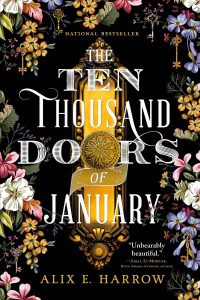The pretty cover of The Ten Thousand Doors of January intrigued me but I was sold when I read the premise, because I love magical realism and stories about passages into other worlds. I started reading the book last winter but had to take it back to the library before I could finish it. I bought my own copy when I learned that the book was nominated for a 2020 Hugo Award.
 The Ten Thousand Doors of January (2019)
The Ten Thousand Doors of January (2019)
Written by: Alix E. Harrow
Genre: Magical Realism
Publisher: Redhook Books
The Premise:
In the early 1900s, a young woman embarks on a fantastical journey of self-discovery after finding a mysterious book in this captivating and lyrical debut.
In a sprawling mansion filled with peculiar treasures, January Scaller is a curiosity herself. As the ward of the wealthy Mr. Locke, she feels little different from the artifacts that decorate the halls: carefully maintained, largely ignored, and utterly out of place.
Then she finds a strange book. A book that carries the scent of other worlds, and tells a tale of secret doors, of love, adventure and danger. Each page turn reveals impossible truths about the world and January discovers a story increasingly entwined with her own.
Lush and richly imagined, a tale of impossible journeys, unforgettable love, and the enduring power of stories awaits in Alix E. Harrow’s spellbinding debut — step inside and discover its magic.
Mild Spoilers Ahead.
Discussion: January Scaller has a most unusual childhood. She lives as the ward of the fabulously wealthy Mr. Locke, the chairman of the New England Archaeological Society, while her father explores the world searching for treasures for Mr. Locke’s collection. She is a headstrong and independent little girl who doesn’t quite belong anywhere. “People are always a little uncertain about me: my skin is sort of coppery-red, as if it’s covered all over with cedar sawdust, but my eyes are round and light and my clothes are expensive. Was I a pampered pet or a serving girl?” (pg. 6). One day in 1901, she finds a door in a field and it opens to a city by the sea.
January is severely punished for finding the door, but her spirit cannot be broken. As she matures into a teenager, she finds solace in the grocer’s son, Samuel Zappia, her nursemaid Jane, and her dog, Sinbad, also known as Bad. January longs to be an explorer like her father and chafes at the restrictions society places on her because of her gender and ambiguous race. When she is seventeen, she finds a mysterious book, The Ten Thousand Doors by Yule Ian Scholar, that tells the story of another rebellious young woman, Adelaide “Ade” Larson, who also finds a door to another world.
The Ten Thousand Doors of January requires patience because it takes a while before the separate threads of the story come together, but it would be a crime to spoil the pleasure of letting you find out for yourself what happens. This is a book with a lot of charm, although it does deal with weighty themes like racism, sexism, and the search for home. I loved idea that the world you were born into is not necessarily your home. The book also has a sense of humor. Yule Ian Scholar writes:
Cats, I have found, seem to exist in more or less the same form in every world; it is my belief that they have been slipping in and out of doors for several thousand years. Anyone familiar with house cats will know that this is a particular hobby of theirs (pg. 138).
January is a charismatic heroine, but my favorite character was Jane. She mysteriously appears at Mr. Locke’s home with a letter from January’s father, saying that he has hired her to be January’s companion. January finds herself in danger as the story progresses and Jane shows that she is much more than a maid or nanny. Jane grows up an orphan at a mission in Kenya, but finds a door to a world of deadly ogres and fierce leopard-women. This other world is her true home. Jane proves herself to be a total bad ass over and over again.
Although this is a book for adults, it reminded me of the joy I found in reading as a child. I found myself swept up in the action and adventure of the story. The main characters are brave and virtuous and there is even a heroic dog. There is a great moment early in the book when Bad bites one of Mr. Locke’s friends who was being racist towards January and Jane. My only complaint about the book was that we did not get enough chances to explore the other worlds.
In conclusion: The Ten Thousand Doors of January reminded me of Alice in Wonderland and Seanan McGuire’s Wayward Children series but it has its own unique charms. Even though McGuire’s series is young adult and this book is not, The Ten Thousand Doors of January is more innocent and sweet. It was a joy to read. The only other Hugo nominated book that I have read is Middlegame by Seanan McGuire, which was too convoluted for my taste. I think The Ten Thousand Doors of January has an excellent chance of winning.

No Comments